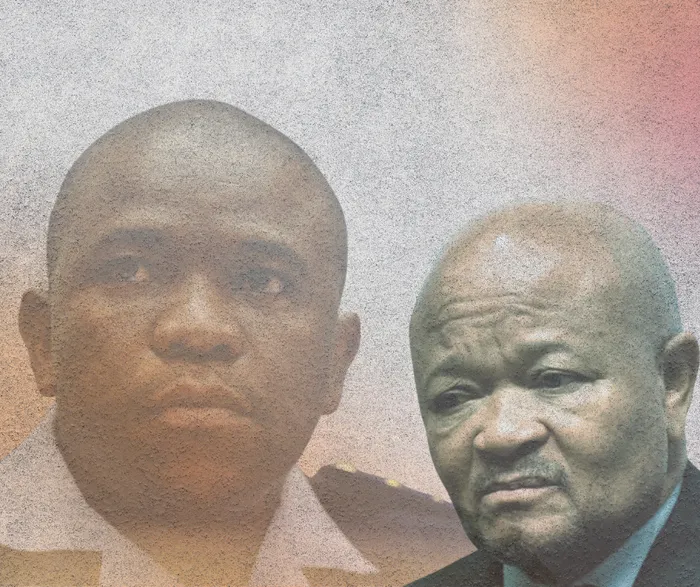Madlanga Commission | SA’s biggest corruption inquiry kicks off this week: here’s what we know

Lt-Gen Nhlanhla Mkhwanazi is expected to deliver explosive testimony as the Judicial Commission of Inquiry into Criminality, Political Interference, and Corruption in the Criminal Justice System begins on Wednesday.
Image: IOL Graphics
It’s all systems go for the Judicial Commission of Inquiry into Criminality, Political Interference, and Corruption in the Criminal Justice System, as KwaZulu-Natal police commissioner Lt-Gen Nhlanhla Mkhwanazi prepares to take the stand at 10 a.m. on Wednesday to lay it all bare.
The Commission’s first public hearing is scheduled for Wednesday at 10am, the Commission confirmed.
Subsequent hearings will begin daily at 9.30am, according to Commission spokesperson Jeremy Michaels.
Michaels noted that public seating at the venue is limited to 300 attendees, with access granted on a first come, first served basis.
“People attending will be seated on a first come, first served basis. Therefore, members of the public must arrive early if they wish to secure a seat,” he said.
“An additional reason for early arrival is that strict access control measures will be in place and no unauthorised entry will be permitted.”
The venue, the Bridgette Mabandla Justice College in Pretoria, has been transformed into a courtroom for what many are calling a pivotal moment in South Africa’s ongoing fight against corruption.
Chaired by retired Constitutional Court Justice Mbuyiseli Madlanga, the Commission has been allocated a substantial budget of R147.9 million over a six-month period.
It was established by President Cyril Ramaphosa to investigate serious allegations of a sophisticated criminal syndicate embedded within the country’s law enforcement and intelligence structures.
At the centre of the inquiry are accusations made public by Mkhwanazi, who is set to be the first witness, testifying over five consecutive days.
His testimony is expected to detail allegations of political interference, including claims that suspended Police Minister Senzo Mchunu unlawfully instructed the shutdown of the Political Killings Task Team - a move Mkhwanazi believes was aimed at obstructing investigations into politically connected criminal networks.
As South Africa braces for the high-stakes Madlanga Commission, the taxpayer is footing a R147.9 million bill across the 2025 and 2026 financial years.
The key question remains: will this be money well spent, or another costly report left to gather dust?
Concerns have been raised over how the Commission’s funds will be spent, who will be contracted to provide services, and whether this inquiry will yield tangible results - unlike previous commissions.
Many political parties have questioned the effectiveness of such inquiries and whether their outcomes justify the high cost.
On Sunday, IOL News reported that both civil society groups and opposition parties had weighed in on the budget allocation.
Karam Singh, spokesperson for the anti-corruption group Corruption Watch, said the organisation would closely monitor how the funds are used.
“There are always concerns about money being wasted or mismanaged. But if we want to consider the cost–benefit, we need to look at the big picture,” Singh said.
“If the allegations are proven, or if more evidence emerges of how the police service is captured or corrupted by organised crime, the value to the country in revealing this - and in ensuring accountability for a better, less corrupt police service - could be immense.”
However, Singh also pointed out that many commissions of inquiry in South Africa have failed to produce meaningful outcomes.
“Commissions of inquiry do not have a good track record when it comes to ultimate accountability and consequences for wrongdoing,” he said.
“Findings and recommendations are not binding and must be actioned by political leadership willing to face the consequences.”
He added that Corruption Watch, along with other civil society organisations, would keep a close eye on the Commission’s work to ensure that it benefits the country.
Opposition parties have strongly criticised the Commission’s high cost, questioning whether it will deliver real value or just serve as political theatre.
The uMkhonto weSizwe (MK) Party called the Commission a “political spectacle of judicial theatrics” and predicted that it would produce little more than “a pile of non-binding recommendations”.
“It will not lead to arrests. It will not root out criminality. It will not end the culture of impunity that has hollowed out our justice system,” said MK Party national spokesperson Nhlamulo Ndhlela.
“It is not a vehicle for justice, but a tool for political interference.”
ActionSA MP Dereleen James echoed these sentiments, arguing that existing oversight bodies such as IPID (Independent Police Investigative Directorate) should be handling such investigations.
“There is no logic in yet another commission of inquiry, especially when the R1 billion Zondo Commission report into state capture is gathering dust while those who committed treason continue to evade justice,” she said.
Build One South Africa (BOSA) spokesperson Rogers Solomons said the Commission’s budget would only be justified if it led to real action.
“The challenge with commissions of inquiry is that the recommendations are not legally binding and end up on a desk somewhere in the Union Buildings collecting dust,” Solomons told IOL News.
simon.majadibodu@iol.co.za
IOL Politics